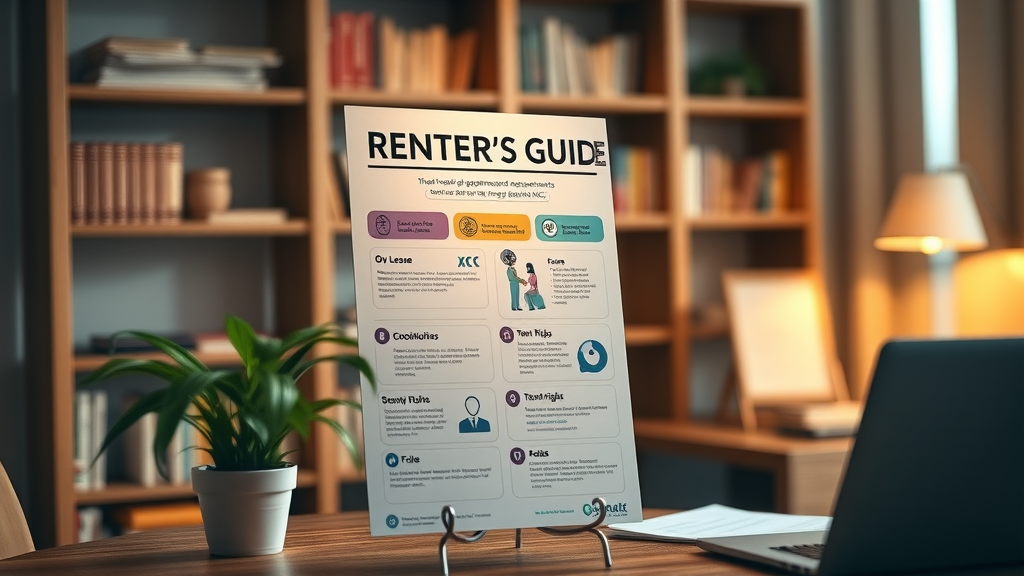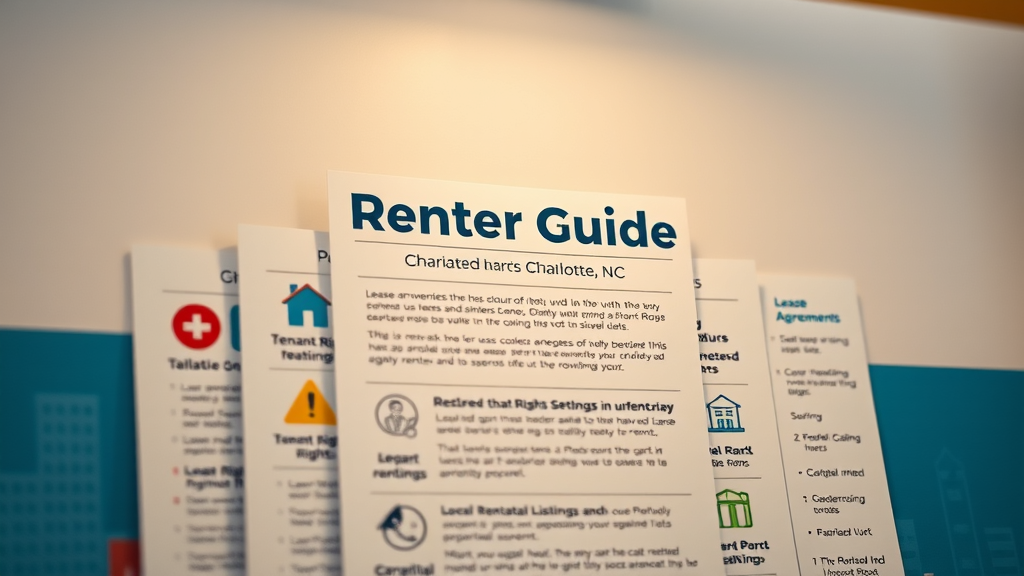Finding the perfect home in a bustling city like Charlotte, NC, can feel overwhelming for renters. With a vibrant market and diverse neighborhoods, it’s essential to have a solid game plan. That’s where our Ultimate Renter Guide for Charlotte, NC comes in. This comprehensive resource is designed to empower you with the knowledge and tools needed to navigate the rental landscape confidently. From understanding local rental laws to discovering hidden gems, this guide will help you turn your home-hunting stress into excitement as you embark on your journey to finding the ideal space!
Understanding Tenant Laws in North Carolina
When renting in Charlotte, understanding tenant laws is essential. These laws not only protect your rights as a renter but also clarify your responsibilities. In North Carolina, tenant laws are designed to create a fair rental market while ensuring both landlords and tenants adhere to specific regulations.
Overview of Tenant Laws
North Carolina’s tenant laws establish a framework for rental agreements, maintenance responsibilities, and tenant rights. Familiarizing yourself with these laws can prevent potential disputes and ensure a smooth renting experience.
| Key Tenant Laws | Description |
|---|---|
| Security Deposits | Limited to two months’ rent, must be returned within 30 days after lease ends. |
| Lease Termination | Requires written notice; typically 30 days for month-to-month leases. |
| Repairs and Maintenance | Landlords must keep rental properties habitable and meet safety standards. |
Key Factors of Tenant Rights
- Right to a Habitable Home: Landlords must maintain properties in a condition that meets health and safety standards.
- Protection Against Discrimination: Fair housing laws prohibit discrimination based on race, color, national origin, religion, sex, familial status, or disability.
- Right to Privacy: Landlords must provide notice before entering your rental space, typically 24 hours.
Lease Agreements and Security Deposits
Understanding your lease agreement is crucial. A lease outlines the terms of your rental, including the duration, rent amount, and conditions for security deposits.
- Security Deposit: Typically equivalent to one month’s rent, it must be returned within 30 days after lease termination.
- Lease Type: Fixed-term leases (12 months) vs. month-to-month leases.
Grace Period and Late Fees
In Charlotte, landlords are allowed to charge late fees if rent is not received on time. It’s common for landlords to offer a grace period of 5 to 10 days before imposing penalties.
“Knowing your rights about late fees can save you money in the long run.”

Rental Market Trends in Charlotte, NC
Understanding the current rental market trends in Charlotte is vital for prospective renters. The real estate landscape in this city is rapidly evolving, influenced by factors such as population growth and economic development.
Current Rental Prices and Market Trends
Charlotte’s rental prices have seen fluctuations due to increasing demand and limited supply. According to RentCafe, the average rent in Charlotte has increased over the past year, making it essential for renters to stay informed.
| Property Type | Average Rent Price |
|---|---|
| Studio | $1,200 |
| 1-Bedroom | $1,500 |
| 2-Bedroom | $1,800 |
Average Rent Prices in Charlotte
- City Center: Higher rents due to proximity to amenities and employment opportunities.
- Suburban Areas: Generally lower rents, offering more space and family-friendly environments.
Finding Rental Properties: A Practical Guide
When searching for rental properties, consider the following tips:
- Utilize Online Platforms: Websites like Zillow and RentCafe can help you find listings that match your criteria.
- Work with a Real Estate Agent: An agent can provide insights into the best neighborhoods and negotiate better lease terms.
- Explore Neighborhoods: Research various neighborhoods to find the best fit for your lifestyle.
“The right tools can make your rental search much more manageable.”

Navigating Rental Agreements in Charlotte, NC
Understanding rental agreements is crucial for a smooth renting experience. These agreements outline the terms and conditions of your lease and clarify the rights and responsibilities of both parties.
Types of Rental Agreements
- Fixed-Term Lease: A lease agreement for a specified period, usually 12 months.
- Month-to-Month Lease: Flexible agreement allowing either party to end the lease with proper notice.
Rights and Responsibilities of Tenants
Tenants have specific rights and responsibilities, including:
- Right to Repairs: Landlords must address maintenance issues to keep the property habitable.
- Responsibility for Cleanliness: Tenants must maintain a clean and safe living environment.
Understanding the Notice Period
The notice period for lease termination varies depending on the type of lease agreement. Typically, a 30-day notice is standard for month-to-month leases.

Finding Apartments in Charlotte, NC
The search for an apartment in Charlotte can be exciting yet daunting. With various options available, having a structured approach can simplify the process.
Using Online Platforms to Find Apartments
Websites such as Zillow and Apartments.com provide comprehensive listings and market trends. Be sure to filter your search based on your budget, location, and desired amenities.
Working with Real Estate Agents
Real estate agents can offer valuable insights into the local market. They often have access to exclusive listings and can negotiate on your behalf.
Neighborhoods to Consider
Charlotte boasts a range of neighborhoods, each with unique characteristics. Some popular areas include:
- Uptown: Perfect for young professionals seeking a vibrant nightlife.
- South End: Known for its trendy restaurants and art scene.
- Ballantyne: Family-friendly with excellent schools and parks.

Maintaining a Safe and Habitable Living Environment
Ensuring a safe and habitable living environment is both a landlord’s and tenant’s responsibility. Understanding health and safety standards is essential for a healthy rental experience.
Health and Safety Standards
North Carolina laws require landlords to ensure that their properties meet specific health and safety standards. This includes providing working heating, plumbing, and electrical systems.
Compliance with Housing Codes
Landlords must comply with local housing codes, which outline the minimum requirements for rental properties. These codes cover everything from structural integrity to sanitation.
Property Maintenance Responsibilities
While landlords are responsible for major repairs, tenants must also maintain their living spaces. Keeping the property clean and reporting maintenance issues promptly can prevent larger problems.

Tenant Rights and Legal Protections
Understanding your tenant rights and legal protections is crucial for a positive renting experience. Knowledge of these rights helps you navigate issues that may arise during your tenancy.
Understanding Tenant Rights
- Right to Fair Housing: You cannot be discriminated against based on race, color, sex, or other protected categories.
- Right to Privacy: Landlords must provide notice before entering your property.
Filing Complaints Against Landlords
If issues arise, tenants have the right to file complaints. Document your concerns and communicate with your landlord first. If unresolved, you may escalate the issue to local housing authorities.
Fair Housing Laws in North Carolina
North Carolina’s fair housing laws protect renters from discrimination. Familiarizing yourself with these laws can provide peace of mind while renting.

Recent Posts and Resources
Staying informed about the rental market and related topics can empower you as a renter. Here are some useful resources to assist you:
Useful Resources for Renters
- Charlotte Housing Authority: Provides information on affordable housing options.
- Legal Aid of North Carolina: Offers legal resources and advice for tenants.
Ongoing Education for Tenants
Understanding your rights and responsibilities is an ongoing learning process. Online resources, workshops, and community events can enhance your knowledge.
Links to Helpful Videos and Articles
- Tenant Rights in North Carolina: An informative video discussing tenant rights and responsibilities in Charlotte, NC.

Conclusion
Renting in Charlotte, NC, can be a fulfilling experience when you are well-informed. This Ultimate Renter Guide for Charlotte, NC has equipped you with essential knowledge about tenant laws, market trends, and your rights as a renter.
Key Takeaways:
- Understand tenant laws to protect your rights.
- Stay updated on rental market trends to make informed decisions.
- Familiarize yourself with rental agreements and your responsibilities.
- Utilize online platforms and real estate agents for effective apartment hunting.
- Maintain a safe living environment by adhering to health and safety standards.
By leveraging this guide, you can transform your rental journey in Charlotte into a smooth and enjoyable experience!
FAQs
What should I do if my landlord refuses to make necessary repairs?
Document all communications and report the issue to local housing authorities if it remains unresolved.
How do I find the best neighborhoods in Charlotte?
Consider factors like proximity to work, amenities, and lifestyle preferences. Use online resources and real estate agents for guidance.
This article aims to provide a comprehensive overview of renting in Charlotte, NC, ensuring your experience is as smooth as possible. Happy renting!
 Add Row
Add Row  Add
Add 




Write A Comment